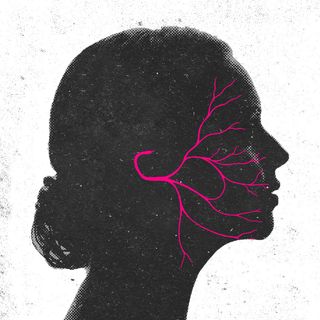Anorexia nervosa is a serious illness associated with a distorted perception of one’s own body image — resulting in reduced food intake to reduce body weight. A new study showed just how high the stakes are when it found that patients with anorexia had shrinkages in parts of the brain due to a dramatic drop in their body mass index (BMI).
The research, published in Biological Psychiatry, specifically noted that the brain’s cortical thickness, surface area, and subcortical volume decreased in patients with anorexia. “The effect sizes observed for cortical thickness deficits in acute [anorexia nervosa] are the largest of any psychiatric disorder investigated in the ENIGMA consortium to date,” the researchers wrote. The ENIGMA consortium, brings together researchers in imaging genomics, neurology and psychiatry to understand the relationship between the brain’s structure and mental health. The changes in brain size and shape were even more significant, in other words, than those observed with depression and other psychological conditions.
To conduct their analysis, the researchers assessed the brain MRI scans of 685 female anorexia nervosa patients and 963 healthy control individuals from 22 locations across the world. The results highlighted more than ever the importance of early intervention for eating disorders — and is also the largest study of its kind to look at the relationship between eating disorders and grey matter.
The study didn’t look into why it happens, but researchers suggest that decreased BMI and nutrient supply to the brain may have something to do with it. Here is where the control group comes into play: “[T]hese deficits associated with lower BMI in the AN sample and were less pronounced in partially weight-restored patients,” the paper stated.
Related on The Swaddle:
Anorexia Is the Most Deadly Eating Disorder; Here’s What You Need To Know About It
The good news, however, is that the changes might be reversible. “We found that the large reductions in brain structure, which we observed in patients, were less noticeable in patients already on the path to recovery… With the right treatment, the brain might be able to bounce back,” Esther Walton, co-author of the study, said in a press release.
Previous studies have shown that anorexia is linked with brain damage, deteriorating both white and grey matter and putting patients at risk for other mental health conditions like depression and schizophrenia. In general, eating disorders were found to be associated with lesions in the brain too. Anorexia is also associated with the highest mortality of all eating disorders. MRI studies have also shown that people with anorexia have different brain functioning that could make some people more vulnerable to it, and that persists even after recovery.
The present study, however, highlights the importance of timely and effective treatment to prevent long-term changes to the brain. “Effects of treatments and interventions can now be evaluated, using these new brain maps as a reference… This really is a wake-up call, showing the need for early interventions for people with eating disorders,” said Paul Thompson from the University of Southern California, who leads the ENIGMA consortium.




